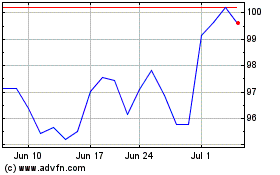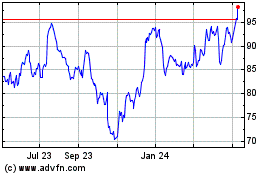Dennis Lynch's fund at Morgan Stanley takes the crown with 30.8%
gain
By Suzanne McGee
This article is being republished as part of our daily
reproduction of WSJ.com articles that also appeared in the U.S.
print edition of The Wall Street Journal (July 9, 2019).
Boring can be beautiful. In fact, in the midst of volatile
markets, being downright dull can prove the recipe for
investment.
That's what The Wall Street Journal's latest quarterly survey of
actively managed U.S.-stock funds suggests. Managers on our list of
Winners' Circle finalists remain upbeat and unflappable. Many
posted returns of more than double the S&P 500 index for the 12
months ended June 30, a period in which that index gained slightly
less than 10%.
Their secret, they argue, is underweighting or ignoring
household names ( Apple, Google parent Alphabet, Facebook, etc.)
that have been common holdings for many of our past winners in
favor of lesser-known businesses able to demonstrate consistently
robust gains in earnings and share prices.
"Most of the funds that have made your list in the past may be
more glamorous or volatile than we are, and they also may own more
speculative or volatile stocks" whose performance is driven by
momentum, says Stephen Grant, manager of Value Line Mid Cap Focused
Fund (VLIFX), who wrapped up the 12-month period with a gain of
26.9%. That puts him in second place in this quarter's Winners'
Circle competition, which seeks to identify those broadly based
U.S. equity funds (no global funds, sector funds, quantitative
funds or leveraged funds qualify) with at least $50 million in
assets and a three-year record that have outperformed their
peers.
The winner: Dennis Lynch, head of the Counterpoint Global team
at Morgan Stanley Investment Management and manager of Morgan
Stanley Institutional Discovery Portfolio (MPEGX) -- which romped
across the finish line with a 30.8% returnfor the trailing 12
months ended June 30.
Lower profiles
This quarter's winners' list is dominated by fund managers who
emphasize stocks you may never have heard of but might want to get
to know, as managers believe these are the companies and stocks
that will keep churning out solid returns in bull markets, and
protect investors from participating in any future selloff. "These
are boring stocks to the casual observer, but to their management,
their businesses are very exciting, and certainly the returns are
great," says Mr. Grant. "Owning them won't make us the top
performer in a bull market, but it will ensure we deliver smooth
and consistent gains over the long term."
In some cases, the shift to less-high-profile stocks has been
the result of a deliberate change in strategy. Mr. Lynch, for
example, says he is reaping the fruits of a decision to
de-emphasize both big tech companies and businesses that have
exposure to the Chinese economy. "Historically, we had some
exposure in these areas, but in the last few years, we've tried to
shift away from that and identify opportunities in smaller and
midsize companies," says Mr. Lynch, who also oversees the
fourth-ranked Morgan Stanley Insight Fund (CPODX), which wrapped up
the same period with a 12-month return of 26.5%.
Instead of owning shares in Amazon.com, Mr. Lynch says, both of
those funds have a stake in a firm that he describes as an
"alternative" to the e-commerce behemoth. Shopify Inc., based in
Ottawa, provides its customers with the platform and tools to
develop an online shopping presence.
"They have benefitted from offering a robust suite of solutions
to their small and medium sized customers and by continuously
developing services that reduce their customers' friction costs,"
Mr. Lynch says, adding that he expects that as its customer base
grows, Shopify also will be able to increase the array of services
clients use. Shopify's stock soared 106% in the 12 months ended
June 30, making it a major contributor to the returns posted by
both Morgan Stanley funds.
Similarly, while many investors may continue to identify Oracle
as the epitome of a database provider to corporations, Mr. Lynch
would rather own MongoDB Inc. While MongoDB may be off the market's
radar, its relational-database-management software is the product
of choice for people who make corporate purchasing decisions --
in-house IT developers. It "is becoming more interesting due to the
fact that it's now developers who are driving adoption and purchase
decisions."
And when it comes to the health-care arena, Mr. Lynch again is
willing to follow the road less taken. Forget about pharmaceutical
companies: One of his favorite businesses is Covetrus Inc., an
animal-health company spun off by Henry Schein Inc. and merged with
Vets First Choice early this year. So far, the stock hasn't kept
pace with some of his other choices, but that's a matter of time,
he calculates. The stock is "misunderstood, because it was a
complex spinoff from Henry Schein and a merger" with a privately
owned company, he says. Given the willingness of American families
to spend on their pets, Mr. Lynch says, "the animal health industry
is showing good steady growth."
This quarter's winners shun flash and pizazz as being too risky
and volatile.
"Would you rather have been one of those Gold Rush miners
praying to strike gold, or the person who chose to sell picks and
pans to the miners?" asks Value Line's Mr. Grant. That's why he
seeks out the contemporary equivalent of those merchants or the
clothing businesses that marketed hard-wearing bluejeans to the
19th-century miners. "It's not what you make in bull markets, it's
what you keep" when those markets wobble, he says. Then investors
don't have to play catch-up.
Today's equivalents to those California entrepreneurs flogging
gold-mining tools include companies that Mr. Grant believes are
least vulnerable to economic headwinds and that have a history of
smooth returns.
One of his favorite holdings is Heico Corp., which sells highly
engineered products and services to companies in defense and
aerospace. Its shares rose 83.7% in the 12 months ended June 30,
even as Mr. Grant notes that the average industrial in the S&P
500 was up 11% and the average industrial in his fund's portfolio
jumped 34%.
Clearly, it's important for a manager to pick the right stocks
-- but this quarter's winners agree that what they avoid is just as
significant.
Selective at Eaton Vance
Virtually all of them run relatively concentrated portfolios,
with 25 to 50 holdings. Currently, Mr. Grant's fund has 40 stocks,
and even that limited list of holdings makes it more diverse than
our No. 3 fund in the contest, Eaton Vance Atlanta Capital Focused
Growth Fund (EILGX). The latter seldom owns more than 30 individual
companies and currently has only about 25 positions -- but still
managed to post a gain of 26.7% in the 12 months ended June 30.
Joe Hudepohl, who has managed the Eaton Vance fund for the past
four years, is content owning only two dozen or so companies in the
$71.2 million portfolio. He says he demands candidates demonstrate
a 10-year operating history as a public company as well as the same
kind of smooth and steady increase in earnings that Mr. Grant looks
for.
"Seeking out quality tends to provide great downside protection
for our investors," he says. "We participate in up markets, and we
protect capital when things are more difficult."
Mr. Hudepohl's fund is a new arrival at the top of the Winners'
Circle rankings, but he isn't surprised. The kind of high-quality
stocks Mr. Hudepohl looks for "have been largely out of favor since
2009 or 2010, until the last 12 or 18 months," he says. "In the
ultralow-interest-rate environment, people will take on more risk,
and that has paid off for them. We had a frustrating few years."
Until, that is, the market became more anxious about the outlook
for both interest rates and earnings growth late last year,
propelling the stock prices of several of Mr. Hudepohl's steady
growers.
Like Messrs. Grant and Lynch, he favors lesser-known businesses
that can deliver steady profits rather than betting that volatile
household names will, in fact, deliver big splashy gains or on
unproven companies that have just gone public. "These are
businesses we tend not to be involved in."
Instead of owning biotech companies, for instance, he likes
Danaher Corp. (up 44.8% in the 12 months ended June 30) and Thermo
Fisher Scientific (up 42.8%). Neither company's fate is tied to the
success of a single research breakthrough. Both make "everything
that you can think of that is used in research and development to
make drugs, do research and develop industrial applications," Mr.
Hudepohl says. Regardless of who wins the biotech wars, both firms
will profit from selling those companies the equipment required to
sustain R&D. The icing on the cake: Both companies are also
good at acquisitions, he says, and devote some of their ample free
cash flow to stock buybacks.
Mr. Hudepohl likes Dollar General (up 36.3%), which he describes
as one of the few retailers he expects to survive and thrive in a
cutthroat environment. The discount dollar store -- with a strong
base in rural areas abandoned by some of its competitors, Mr.
Hudepohl says -- has posted strong growth in the square footage of
its stores and in same-store sales.
All about control
For these top-performing managers, it's all about control. They
acknowledge there's no way to manage or predict big trends -- from
trade spats or retail-sales growth to interest-rate decisions by
Federal Reserve policy makers. "All you can do is find the stuff
you can predict, like earnings and individual business trends, and
own that," Mr. Hudepohl says.
Readers may also draw some lessons from this approach. While
these outperforming funds have done well over the past 12 months,
most of their managers have endured longer periods during which
they were laggards and only now are reaping the benefits of
investment decisions made three or more years ago. "Our goal is
outperformance over a full market cycle, not just the short term,"
says Mr. Hudepohl. "The short term isn't what we're about."
Ms. McGee is a writer in New England. She can be reached at
reports@wsj.com.
(END) Dow Jones Newswires
July 09, 2019 02:47 ET (06:47 GMT)
Copyright (c) 2019 Dow Jones & Company, Inc.
Morgan Stanley (NYSE:MS)
Historical Stock Chart
From Mar 2024 to Apr 2024

Morgan Stanley (NYSE:MS)
Historical Stock Chart
From Apr 2023 to Apr 2024
